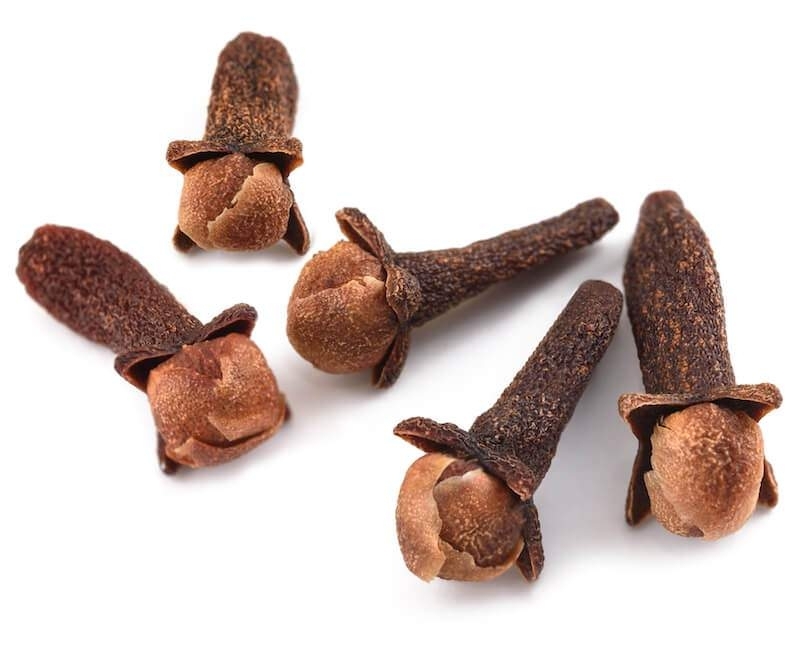CLOVE BUD OIL

OVERVIEW
Clove bud oil is derived from the clove tree, a member of the Myrtaceae family native to Indonesia and the West Indies. The plant itself is typically found in low-lying areas that have a humid climate. It is also a hardy plant, growing well in poor-quality soil (but not sandy soil). A fully grown clove tree can reach a height between 10 and 12 meters (approximately 32 to 39 feet), with tough evergreen leaves. The flowers (or buds) are clustered and generally forked into three peduncles or “stems” as they are often called.
Today, clove bud oil is known for its benefits to oral health. A study published in the British Dental Journal notes that clove oil may be effective for teething pain in children. In another study, clove extracts were found to help fight bacteria responsible for gum disease. Clove bud oil owes much of its health benefits to eugenol, which comprise up to 89 percent of the oil. This compound provides potent antiseptic, anti-inflammatory and antioxidant properties.
APPEARANCE
Light golden yellow coloured liquid
ODOUR
Rich warm, sweet-spicy, woody, slightly bitter odour
ORIGINAL PLANT
Eugenia caryophyllatasyn Syzygium aromaticum
CAS NUMBER
8000-34-8 ; 84961-50-2
FEMA NUMBER
2325
EINECS NUMBER
284-638-7
PRODUCT CODE
AFE003008
SYNONYM
Laung, caryophyllus aromaticus bud oil
PARTS USED
Buds
EXTRACTION METHOD
Steam Distillation
SHELF LIFE
24 Months
FLASHPOINT
>100°C
SPECIFIC GRAVITY
1.030-1.075 @ 20°C
REFRACTIVE INDEX
1.525-1.538 @ 20°C
QUALITY
100% Pure and Natural
SOLUBILITY
Insoluble in Water; soluble in alcohols
DIGESTIVE AID
One of the traditional clove oil uses has been for the treatment of common complaints related to the digestive system, including indigestion, motion sickness, hiccups, bloating and flatulence (accumulation of gas in the digestive tract). Applying a few drops of the oil to your pillow and inhaling it as you sleep can help reduce a lot of nausea related problems.
IMPROVES BLOOD CIRCULATION
Clove bud oil is used in pain relief balm to help improve circulation. Since this specialty balm is used to soothe muscle aches and pains, cloves are the active ingredient that helps the blood flow through the area and help reduce the pain. Its extracts reduce toxins in the blood and increase the levels of antioxidant activity in the body . It also has antimicrobial and anti-fungal properties, which further aid blood purification. Because it helps improve circulation, clove oil is ideal for reducing the pain and discomfort typically associated with tension headaches.
REDUCES VARIOUS TYPES OF PAIN
Many people know about the healing qualities of clove oil for toothaches and other tooth pains. For centuries, cloves have been used as a pain relief technique. Historically, treatments called for inserting the clove into an infected tooth or cavity. They contain an active ingredient that numbs the skin it touches, which may provide temporary relief from the toothache. In addition to toothaches, cloves are said to be helpful in reducing the pain of dry socket, a common complication that occurs whenever a tooth is pulled.
GOOD FOR SKIN
Clove oil is found in soaps, lotions and even in perfumes. Clove oil contains a compound called eugenol, which is known for its antibacterial properties. It is effective in curing acne, killing bacterial infections and reducing swelling. Clove oil can help fight signs of anti-ageing too. It has exfoliating properties and removes dead skin leaving you with fresh and young skin.
OTHER BENEFITS
Eugenol in clove oil proves effective for treating gastric problems like indigestion and flatulence, reduces hair fall and also promotes hair growth, can reduce the effect of nausea and morning sickness to a great extent.







